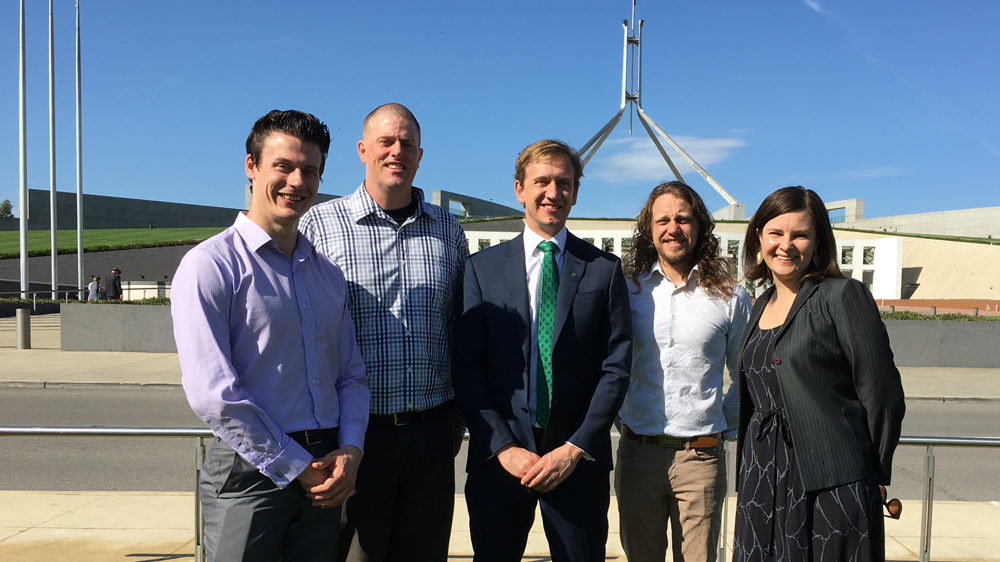In 2012, I was invited to Canberra—our national capital—to participate in an event called “Voices for Justice.” Hosted by Micah Australia, a coalition of Christian development and justice agencies, including ADRA Australia, the annual event brings together about 200 Christians from across Australia to speak on issues addressing global poverty, Australia’s commitment to international aid and the challenges of climate change, particularly its impacts on the world’s poorest and most vulnerable people.
It seemed to me a practical way to live out the injunction of Proverbs 31:8: “Speak up for those who cannot speak for themselves; ensure justice for those being crushed.”1 Not only was my initial “Voices for Justice” experience an opportunity to do this, but it was training and empowerment in how to do it. I have been emboldened to use my voice, influence and opportunities in greater advocacy on these issues that matter. And I have encouraged others to consider how a “mission trip” to Canberra—or Washington or wherever political leaders gather—might be at least as important as the more usual mission trips to work on projects in developing nations.
In 2012, our call was to “Finish the Race.” In lobby group meetings with our elected leaders, we praised the progress that had been made internationally toward meeting the Millennium Development Goals. Amid other achievements and ahead of the 2015 schedule, reports showed that the percentage of people worldwide living in extreme poverty had been halved from 1990 levels because of the focus given to these goals by governments around the world.
In Australian politics at that time, there was bipartisan support for moving toward the goal of Australian aid reaching 0.5 per cent of Gross National Income (GNI), even that still short of the international agreed target for the world’s leading economies of 0.7 per cent but heading in a good direction. Led by the nation’s first female prime minister, Australia had implemented a tax on carbon pollution as a significant step toward reducing our greenhouse gas emissions and curbing dangerous climate change. Thus, our call for a renewed commitment by our government to help reach more of the targets of the Millennium Development Goals internationally.
I have spent time in Canberra a couple of times since, but returned in November, 2016, after a change of government, three changes of prime minister and a significant shift in political will. The carbon tax has been repealed, despite supposed ongoing commitments to act in response to climate change. And Australian aid is now the least generous in our modern history at just 0.23 per cent of GNI. Despite comprising less than 2 per cent of Australia’s national budget, our contribution to the poorest and most vulnerable people in the wider world has borne 25 per cent of total budget “savings” in the past few years. [pullquote]
While I know these issues are not primarily about me, I can’t help feeling like something of a failed lobbyist in some moments of reflection. The five years of my greatest political engagement have seen significant reversals on the issues I have been speaking about. For me, this is a frustration and disappointment; for others—those most at risk and most affected by these political decisions—it’s as serious as survival.
Which is why I need to keep speaking. Which is why we need others to join in raising their voices on these important issues.
In the face of these setbacks, hope contradicts. Or as Jürgen Moltmann expressed it more fully, “In the light of the present promise and hope, the as-yet-unrealised promise of the future stands in contradiction to given reality.”2
As we sang in the old protest hymn as part of one of our times of worship together at “Voices for Justice” this year, waking echoes of many faithful activists of the past, “We shall overcome, some day.” This might not be today in Canberra. But the Bible assures us this is true in the fullest sense and that working in harmony with and to further God’s intention for justice and peace in our world is necessary faithfulness. “Don’t be misled—you cannot mock the justice of God. You will always harvest what you plant,” Paul urged the Galatians. “So let’s not get tired of doing what is good. At just the right time we will reap a harvest of blessing if we don’t give up. Therefore, whenever we have the opportunity, we should do good to everyone—especially to those in the family of faith” (Galatians 6:7, 9, 10).
Even while the political response on many of the issues on which I have been working seem to be going backwards, I am only a failing lobbyist. While so many of us continue to speak for justice, we have not failed. And while we continue to speak for and with the poor, the oppressed and the vulnerable—those the Bible assures us have a special place in God’s hearing and concern—hope contradicts the uglier political realities of today. And hope persists. In God’s great promises, we shall overcome, some glorious day. That’s what we speak and act towards today.
For a report of the Adventist involvement in this year’s “Voices for Justice” event, see Kiribati Adventist Youth Urge Greater Climate Action.






